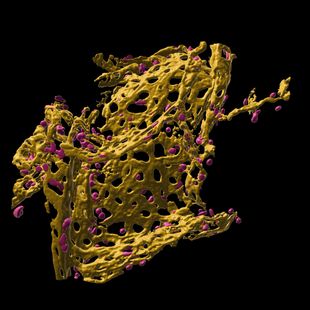To mechanistically understand the root causes of lung disease, and identify drugs that target specific pathways, the scientists around DZL PIs Prof. Herbert Schiller and Dr. Gerald Burgstaller are collecting deep molecular insights from patient samples and combining these with experimental interventions in the laboratory. A new combination of methods now enabled them to study mechanisms directly in human lung tissue, thereby accelerating drug development for novel therapies. This groundbreaking work is now published in Science Translational Medicine.
Revolutionizing Pre-Clinical Drug Development: Organotypic Model System for Lung Research
A new promising experimental model to mechanistically study lung disease emerged recently: so-called human precision-cut lung slices (hPCLS). These are thin sections of lung tissue, that can be used for experiments in the lab. To generate hPCLS, scientists from Helmholtz Munich work with human lung tissue obtained from patients undergoing surgery due to lung diseases. The tissue gets cut into thin slices that can be kept alive in the lab. hPCLS have the unique advantage of retaining the full cellular diversity and native three-dimensional structure of the lung.
The team of researchers around Prof. Schiller and Dr. Burgstaller have now performed an in-depth analysis of all cells within the hPCLS, thereby significantly advancing the possibilities and usage of this lung disease model. They leveraged the power of single-cell genomics, which records gene activities in individual cells, to analyze the activity of all cells in hPCLS after specific experimental and therapeutic treatments.


